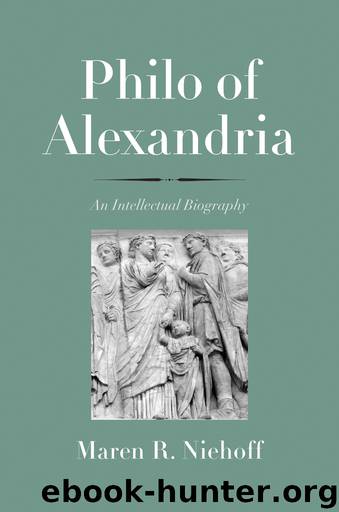Philo of Alexandria by Maren R. Niehoff

Author:Maren R. Niehoff [Niehoff, Maren R.]
Language: eng
Format: epub
Publisher: Yale University Press
Published: 2017-01-18T05:00:00+00:00
PART 3
Young Philo among Alexandrian Jews
9
Biblical Commentary
Having appreciated Philo in his later works, which he wrote in the context of his embassy to Rome, we are now in a position to address the riddle of his early years. Relying on the comparative method outlined in chapter 1, I turn now to the Allegorical Commentary, which radically differs from the later treatises in terms of genre, style, and philosophical orientation. These differences prompt us to investigate the context in Alexandria, where Philo began his career before embarking on his diplomatic mission in Rome. The Allegorical Commentary offers a glimpse into the intellectual world of Philo as a young man, when he addresses fellow Jews in Alexandria and engages in a verse-by-verse commentary on the Greek translation of Genesis.1 In this part of the book we move from the mature statesman and advocate of Judaism in Rome to the budding philosopher and Bible scholar in Alexandria. Philo’s early work is based on a close reading of Scripture and creates a quite complicated web of allegorical interpretations rather than providing a continuous narrative easily accessible to the uninitiated. Philo’s commentary is the first of its kind extant in Judaism and naturally raises questions regarding the circumstances of its emergence. How, in other words, did he conceive of the idea of investigating the Bible in such a scholarly manner? Moreover, what role did the intellectual climate of Alexandria play in shaping Philo’s approach?
The Alexandrian Context of the Allegorical Commentary
Alexandria, the Hellenistic center of scholarship, helps us understand the nature of Philo’s Bible commentary and its hermeneutic assumptions. Running commentaries were produced there in a great variety of areas, ranging from Homer’s epics to tragedy and history, and also were institutionally supported at the Museum, which was an early form of a university. Alexandria produced the first systematic, literary commentaries on the Homeric epics, which set the standards for all subsequent scholarship in the Western tradition. Alexandrian scholars addressed a professional audience, starting their work with comments on minute details of the text, asking, for example, why Homer started the Iliad with a reference to Achilles’s wrath.2
Aristarchus of Samothrace (second century BCE) was the most learned and influential scholar of Homer in Alexandria. He wrote two successive editions of the text, treatises on specific topics, and two running commentaries. The critical signs in Aristarchus’s edition were linked to his commentaries, in which he discussed the literary problem at stake. Whether or not he ever pronounced the famous principle, preserved by Porphyry, that “Homer is to be elucidated by Homer,” he paid special attention to the internal coherence of the entire corpus.3 Assuming that Homer had authored both the Iliad and the Odyssey, Aristarchus inquired into his characteristic style and presentation of dramatic figures. Issues of verisimilitude and contradictions between lines became central concerns. Insisting that Homer could not have written anything “ridiculous,” Aristarchus bracketed some epic lines, because “horses do not drink wine” and “it is implausible that horses speak.”4 He moreover addressed problems of contradictions, often solving them by suggesting a gap in the text.
Download
This site does not store any files on its server. We only index and link to content provided by other sites. Please contact the content providers to delete copyright contents if any and email us, we'll remove relevant links or contents immediately.
Waking Up in Heaven: A True Story of Brokenness, Heaven, and Life Again by McVea Crystal & Tresniowski Alex(37003)
Still Foolin’ ’Em by Billy Crystal(35542)
Cecilia; Or, Memoirs of an Heiress — Volume 1 by Fanny Burney(31332)
Cecilia; Or, Memoirs of an Heiress — Volume 3 by Fanny Burney(30934)
Cecilia; Or, Memoirs of an Heiress — Volume 2 by Fanny Burney(30889)
Fanny Burney by Claire Harman(25784)
Empire of the Sikhs by Patwant Singh(22172)
We're Going to Need More Wine by Gabrielle Union(18072)
Plagued by Fire by Paul Hendrickson(16636)
Hans Sturm: A Soldier's Odyssey on the Eastern Front by Gordon Williamson(16621)
Out of India by Michael Foss(16312)
Cat's cradle by Kurt Vonnegut(13866)
Molly's Game by Molly Bloom(13353)
Bombshells: Glamour Girls of a Lifetime by Sullivan Steve(13108)
Pimp by Iceberg Slim(12931)
All the Missing Girls by Megan Miranda(12747)
Leonardo da Vinci by Walter Isaacson(11901)
4 3 2 1: A Novel by Paul Auster(11047)
The Radium Girls by Kate Moore(10907)
